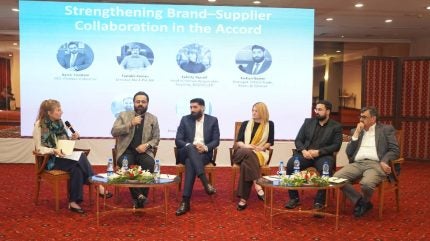
Held at Lahore’s Avari Hotel on 23 October 2025, the Brand-Supplier Roundtable brought together more than 50 brand representatives and 30 key suppliers.
In his opening remarks, PVH Corp global affairs corporate responsibility senior vice president Michael Bride said: “With over 140 brands now part of the Pakistan Accord, our message to our supplying partners is clear: we believe in Pakistan’s potential and remain committed to investing in the country’s textile and garment industry.”

Discover B2B Marketing That Performs
Combine business intelligence and editorial excellence to reach engaged professionals across 36 leading media platforms.
Central to the discussions was the role of the Pakistan Accord as an enabler of lifesaving safety measures and transparency around risk monitoring.
A special panel was assembled to delve into methods of enhancing brand-supplier collaboration.
The panel included Felicity Tapsell from BESTSELLER, Farhan Nazeer from Marks & Spencer, Aamir Chottani representing Chottani Industries, Raffay Bin Rauf of Sapphire Finishing Mills, and Farrukh Zaman from Klash.
Suppliers highlighted the necessity for enhanced technical engineering capabilities and a more transparent return on investment regarding safety protocols.

US Tariffs are shifting - will you react or anticipate?
Don’t let policy changes catch you off guard. Stay proactive with real-time data and expert analysis.
By GlobalDataIn addition, they emphasised the importance of continued backing from brands through enduring, long-term business partnerships.
Chottani Industries CEO and Pakistan Readymade Garment Manufacturers and Exporters Association (PRGMEA) South Zone chairman Aamir Chottani said: “The Accord is a door opener for business to suppliers; it builds confidence for the top management of brands that inspections are conducted independently and transparently.”
Following the Roundtable, an internal brand meeting focused on operations and collective efforts to ensure the successful continued rollout of the Pakistan Accord.
In August this year, the International Accord introduced a remediation costing tool to aid Pakistani factories in planning and estimating remediation costs more effectively. This move forms part of their latest efforts to enhance workplace safety in the country.





